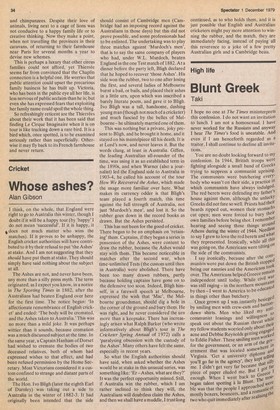Cricket
Whose ashes?
Alan Gibson
I think, on the whole, that England were right to go to Australia this winter, though I doubt if it will be a happy tour (by 'happy' I do not mean 'successful'. If it is happy, it *does not much matter who wins the matches), If it proves to be unhappy, the English cricket authorities will have contributed to it by their refusal to put 'the Ashes' at stake. And I am not suggesting that they should have put them at stake. They should simply have said nothing about the subject at all.
The Ashes are not, and never have been, any more than a silly press myth. The term originated, as I expect you know, in a notice in The Sporting Times in 1882, after the Australians had beaten England over here for the first time. The notice began: 'In affectionate remembrance of English cricket' and ended: 'The body will be cremated, and the Ashes taken to Australia.' This was no more than a mild joke. It was perhaps wittier than it sounds, because cremation was a much discussed subject at the time. In the same year, a Captain Hanham of Dorset had wished to cremate the bodies of two deceased relatives, both of whom had expressed wishes to that effect, and had been refused permission by the Home Secretary. Most Victorians considered it a custom confined to strange and distant parts of the world.
The Hon, Ivo Bligh (later the eighth Earl of Darnley) was taking out a side to Australia in the winter of 1882-3. It had originally been intended that the side should consist of Cambridge men (Cambridge had an imposing record against the Australians in those days) but this did not prove possible, and some professionals had to be enlisted. The undertaking was to play three matches against 'Murdoch's men', that is to say the same company of players who had, under W.L. Murdoch, beaten England in the one Test match of 1882. At a dinner before the party left, Bligh declared that he hoped to recover 'those Ashes'. His side won the rubber, two to one after losing the first, and several ladies of Melbourne burnt a bail, or balls, and placed their ashes in a little urn, upon which was inscribed a barely literate poem, and gave it to Bligh. Ivo Bligh was a tall, handsome, dashing young man (though not much of a cricketer) and much fancied by the belles of Melbourne he ultimately married one of them.
This was nothing but a private, joky present to Bligh, and he brought it home, and it stayed on his mantelpiece till his death. It is at Lord's now, and never leaves it. But the words clung, at least in Australia. Giffen, the leading Australian all-rounder of the time, was using it as an established term in the 1890s, and when Warner (also a journalist) led the England side to Australia in 1903-4, he called his account of the tour How We Recovered the Ashes, which made the usage more familiar over here. What makes its currency odder is that Bligh's team played a fourth match, this time against the full strength of Australia, not just 'Murdoch's men', and lost it. So the rubber goes down in the record books as drawn. But the Ashes persisted.
This has not been for the good of cricket. There began to be an emphasis on 'retaining' them. Captains, if they began a series in possession of the Ashes, were content to draw the rubber, because the Ashes would stay with them. This became noticeable in matches after the second war, when time-unlimited Tests (the custom until then in Australia) were abolished. There have been too many drawn rubbers, partly because holding captains have gone on to the defensive too soon. Indeed, Bligh himself, in a farewell speech at Melbourne, expressed the wish that 'Mac', the Melbourne groundsman, should dig a hole in the corner of the ground and bury them. He was right, and he never considered the urn more than a keepsake. There has increasingly arisen what Ralph Barker (who wrote informatively about Bligh's tour in The Cricketer Spring Annual of 1972) calls a 'paralysing obsession with the custody of the Ashes'. Many others have felt the same, especially in recent years.
So what the English authorities should have said, when asked whether the Ashes would be at stake in this unusual series, was something like: 'Er —Ashes, what are they?' It was the perfect opportunity missed. Still, if Australia win the rubber, which I am rather inclined to think they will, the Australians will doubtless claim the Ashes, and then we shall have a muddle, I trust long continued, as to who holds them, and it is just possible that English and Australian cricketers might pay more attention to winning the rubber, and the match, they are immediately facing, instead of paying all this reverence to a joke of a few pretty Australian girls and a Cambridge beau.











































 Previous page
Previous page